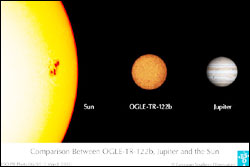
Very Large Telescope Finds Planet-Sized Transiting Star
An international team of astronomers have accurately determined the radius and mass of the smallest core-burning star known until now.
The observations were performed in March 2004 with the FLAMES multi-fibre spectrograph on the 8.2-m VLT Kueyen telescope at the ESO Paranal Observatory (Chile). They are part of a large programme aimed at measuring accurate radial velocities for sixty stars for which a temporary br
The human brain is like a general in a bunker. Floating in its bubble of cerebrospinal fluid, it has no direct window to the outside world, so the only way for the brain to observe, comprehend, and order the body into action is to rely on information it receives. This information comes to it through a sophisticated system of sensory neurons that connect the brain to organs like the eye, ear, nose, and mouth.
In recent years, biologists and neuroscientists have been trying
Mayo Clinic researchers have discovered a genetic marker that may pave the way for a fast, inexpensive blood test to predict one type of deadly stroke that strikes 30,000 people in the United States annually.
The article and an editorial appear in the March edition of the Journal of Neurosurgery, http://www.thejns-net.org/jns/issues/toc_pre.html. The Mayo Clinic researchers report that people with key variations in a gene that affects the ability of blood vessels to relax are 10 ti
Weizmann Institute findings might advance search for new therapies for injured nerve fibers
Long distance messengers star in many heroic tales, perhaps the most famous being the one about the runner who carried the news about the victory of the Greeks over the Persians in the fateful battle of Marathon. A team of researchers at the Weizmann Institute of Science has now discovered how molecular messengers perform a crucial role in the ability of injured nerve cells to heal them
Clearance of beta amyloid accumulation within neurons stops memory decline in mice
Researchers at UC Irvine have identified a trigger at the molecular level that marks the onset of memory decline in mice genetically engineered to develop brain lesions – in the form of plaques and tangles – associated with Alzheimer’s disease. The trigger is a protein called “beta amyloid” that accumulates within neurons in the mice’s brains. Although several researchers have studied the
Research by a University of Nottingham expert has shed new light on a genetic mystery that has its origins millions of years ago.
A study by Dr Angus Davison has helped to uncover new facts about the most common organic compound found on earth — a substance called cellulose. Cellulose is found in large amounts in all crops and plant life, making it one of the foundations of modern farming, human diet and the global economy.There is just one problem with it: most animals are unable to